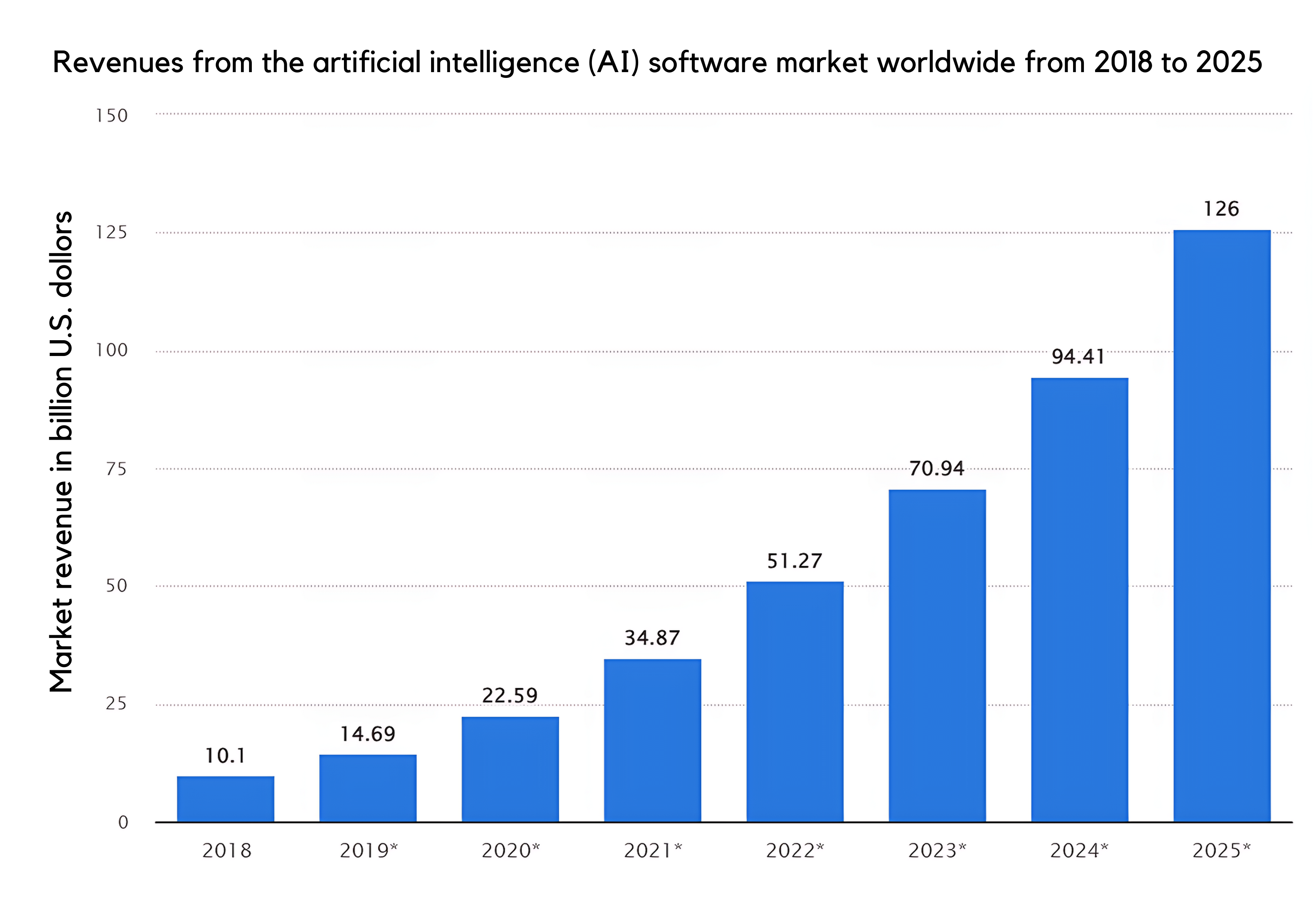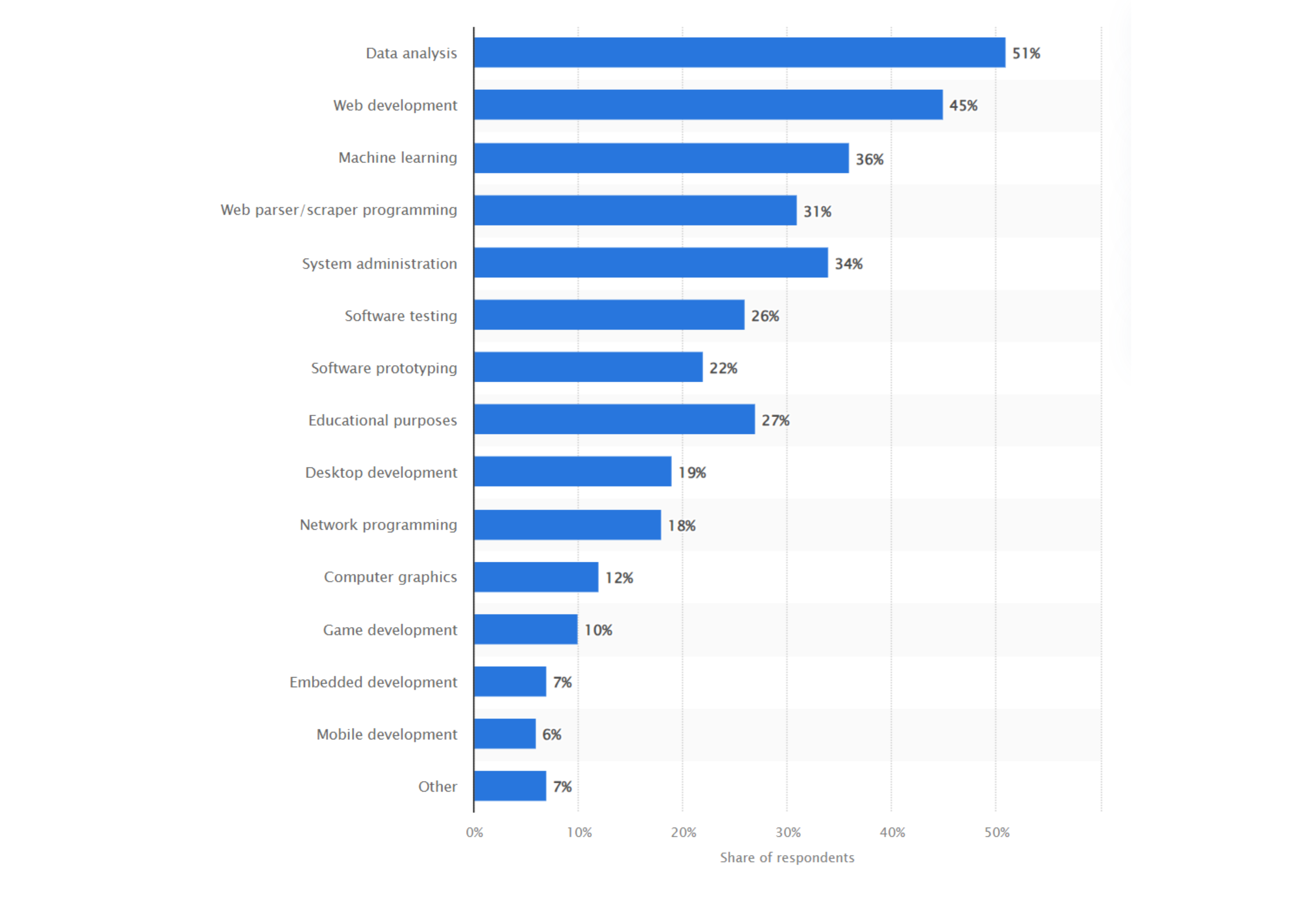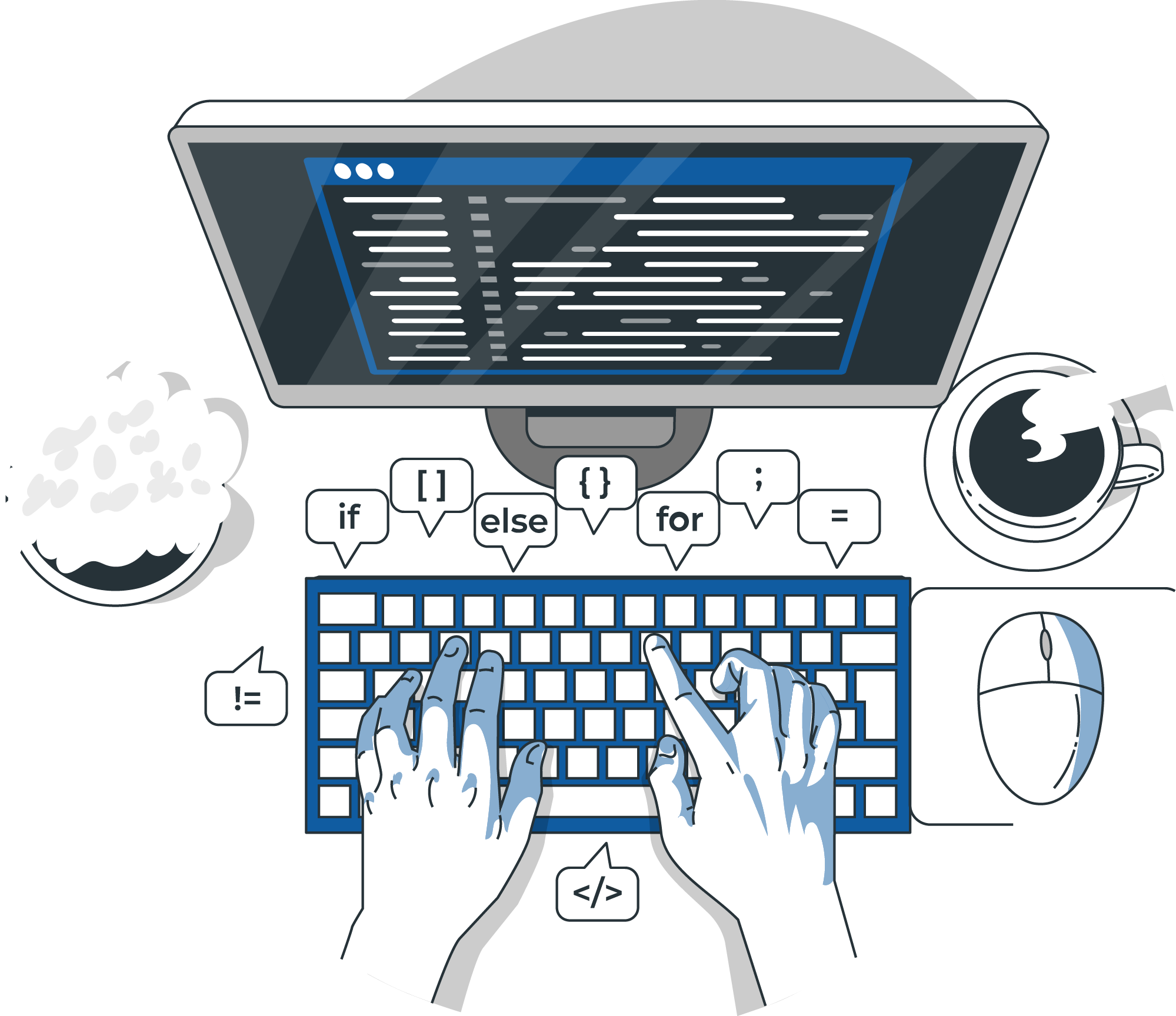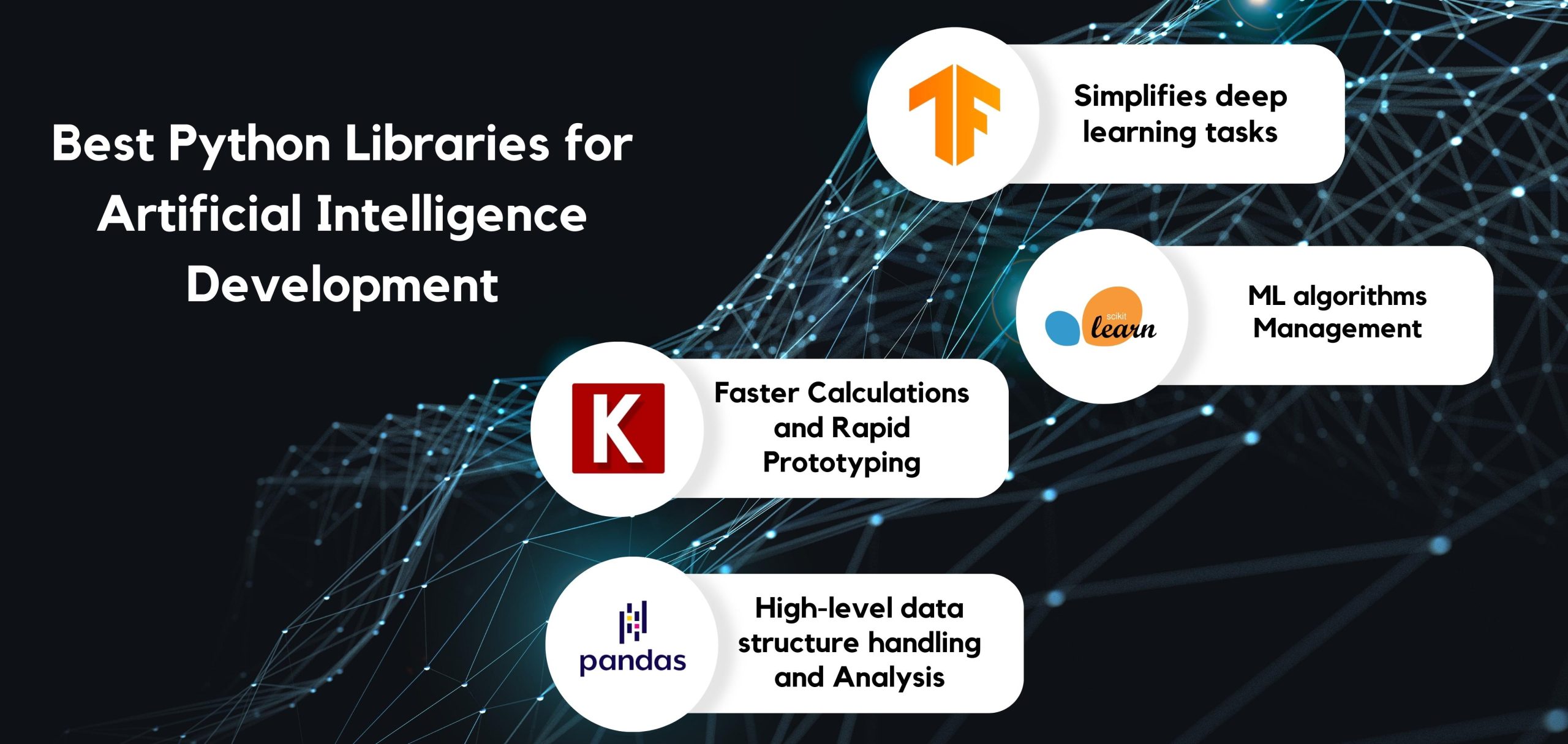The global revenue from the Artificial Intelligence software market is to cross 126 billion by 2025. With such mesmerizing numbers, various businesses are trying to capture the Artificial Intelligence market with innovative solutions.
However, you need to select the right technology tools when building software solutions with disruptive technologies. Building Artificial Intelligence with Python programming language has emerged as an option for a range of solutions.
This guide helps you with the following:
- An Introduction to Artificial Intelligence & Python
- Benefits of Developing Artificial Intelligence with Python
- Popular Python libraries for developing Artificial Intelligence Solutions
- Python use cases for AI
Let’s begin.
An Introduction to Artificial Intelligence & Python

Artificial intelligence refers to the capabilities of machines being able to do various tasks and activities that otherwise require human intervention. For example, with AI, computers and smartphones can make several decisions for the users, which earlier needed a dedicated human. AI refers to the simulation of man’s intelligence by machines.
There are several AI-based products and tools we use every day. For example, Siri, Google Assistant, and Amazon Alexa are all AI-powered assistants. These assistants performed a wide range of tasks and activities for us.
Building AI-powered software requires a programming language that offers high readability, performance, and scalability. All three parameters are met by Python, which makes it an ideal language for building advanced solutions.
You May Find This Interesting : PHP Vs Python – Choose The Best Language For Futuristic Web Development
Benefits of Developing Artificial Intelligence with Python
1. Lesser lines of Code
Building Artificial Intelligence with the Python programming language saves you significant development time. Thanks to Python’s predefined packages, programmers do not have to invest time in coding algorithms. Additionally, it also follows the “check as you code” methodology, which saves significant time in testing the Code.
2. Handy In-Built Libraries
You can quickly implement Machine Learning functions into the development project using the Python language. It comes with several in-built libraries that support the development of AI and Ml-based projects.
Installing and loading these libraries lets you implement various readymade features into the development project. Some of the popular libraries used in AI and Ml-based projects are NumPy, Theano, Tensorflow, OpenNN, etc.
3. Suitable for a Range of Solutions
The Python Language can be used to build various kinds of AI solutions and general-purpose apps. You can hire a dedicated developer to make simple or complex web solutions using this general-purpose language. Data analysis, web development, machine learning, and many other kinds of apps or software solutions can be built using Python.
The infographic below offers insights into some of the popular applications of using the Python language.

4. Simple Syntax
Building simple and complex solutions of Artificial Intelligence with Python provides you access to simpler syntax. The language uses a clean syntax which is easier to learn, and even beginners find it easier to master. Thus onboarding new programmers into the Si development project becomes a breeze.
5. Cross-Platform Compatibility
Your AI project is powered with platform independence as Python code can run on Windows, MacOS, Linux, Unix, and others. There’s also the PyInstaller package that lets you transfer Code from one platform to another with ease.
6. Mature Community Support
Python has extensive community support, and developers worldwide use it for creating a range of software solutions. As a decades-old programming language, there are several experts available who can help you in case you get stuck. Moreover, there are various communities and forums where programmers can post their issues and find solutions for zero additional charges.

Popular Python Libraries for Developing Artificial Intelligence Solutions
The availability of tons of handy libraries saves time and reduces the effort of developing Artificial Intelligence solutions. Some of the trending libraries Python development companies use in building AI solutions are

- Scikit-learn – It helps with the management of basic ML algorithms like clustering, linear and logistic regressions, classification, etc.
- Pandas – It is meant for handling high-level data structures and analysis. You can merge and also filter data or export it from outer sources like Excel.
- Keras – This library is ideal for deep-learning applications. You get faster calculations and rapid prototyping with the Keras library in AI development solutions.
- TensorFlow – It is another powerful Python library for handling deep learning solutions. It allows you to set up, train, and utilize artificial neural networks with huge datasets.
Must Read: Top 7 Python Libraries for AI and ML
Python Use Cases for AI
Various solutions of Artificial Intelligence with Python have been developed by programmers worldwide. However, the futuristic ones that are changing the scenario of web development and businesses worldwide are NLP, Predictive Analytics, Computer Vision, etc.
Here’s a detailed discussion of some of these use cases.
Natural Language Processing
NLP is concerned with communication between humans and machines. Python is famous for building various natural language processing-based solutions. For example, Python has been used to develop chatbots, language translation, sentiment analysis applications, and more.
Chatterbot is a Python-based development platform that lets you create chatbots with ease. With just a few lines of Python-based Code, you can build advanced chatbots for diverse industry applications. The chatterbot platform also lets you train the developed chatbot by exporting Whatsapp chats into the developed solution.
Different chatterbot versions support building chatbots with varying versions of the Python language. So based on the existing version of your Python application, you can create a specific chatbot efficiently.
Predictive Analytics
Another famous application of Artificial Intelligence with Python language is Predictive Analytics. Software based on Predictive Analytics can make probable futuristic outcomes by analyzing the available historical data via statistical modeling, data techniques, and ML. Practical applications of predictive analytics are found in sales forecasting, risk assessment, financial modeling, and more.
Computer Vision
Python-based computer vision applications involve the use of object detection, facial recognition, image segmentation, etc. Computer vision has become much popular in recent times, and its application of facial recognition has been deployed over an extensive range of smartphones, laptops, PCs, desktops, etc.
For example, AiCure is a startup that uses facial recognition and pill recognition, and action recognition to administer medicine consumption among patients. The application can even analyze the patient’s condition and whether the medication is working correctly.
Developing such advanced AI applications using the Python language has become much more popular. Python provides several advanced libraries that help to build such apps in less time.
Wrapping Up
The Python programming language will dominate the development of AI solutions in the coming years. Its high performance, scalability, and availability of several futuristic libraries make it a perfect choice for developing advanced AI solutions.
Python is also suitable for developing a range of general-purpose web apps and websites. It offers excellent productivity among the developer’s team and helps in building high-performing apps. Hire Python developers to build bug-free high-speed apps for your business.

2500+
Project Launched
20+
Years of Experience
250+
Skilled Professionals
60+
Days of Free Support
Frequently Asked Questions
Q1. Can You Do AI with Python?
Yes, absolutely. The Python language offers several advanced features and multiple libraries for building AI solutions. For example, you have scikit-learn for Machine Learning applications, Pandas for high-level data structures, etc.
Q2. Is AI hard in Python?
If you want to pursue AI with Python, it’s vital that you learn fundamental mathematical concepts like probability and statistics, complex linear algebra, and calculus to gain a good grasp of the programming language.
Q3. Which Language is Best for AI?
Python, Java, C++, and Scala are some of the ideal languages for developing AI-based solutions. These languages offer the optimum balance of scalability and performance, which makes them a good option for developing AI solutions and machine learning model.


